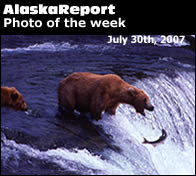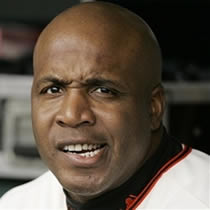
 |
 |
Steroid junkie Barry Bonds ties Henry Aaron at 755Commissioner Bud Selig expressed his feelings by standing up and putting his hands in his pockets while Bonds rounded the bases.By Dennis Zaki - Barry Bonds, performance-enhancing steroids and all, moved one home run away from becoming baseball's new home run king. 
Bonds' homer in the second inning of Saturday's game against the Padres in San Diego was the 755th of his 22-year scandal-plagued career. The homer record was held by Henry Aaron for 33 years. Commissioner Bud Selig showed exactly how he felt by standing up and putting his hands in his pockets while Bonds rounded the bases. Bonds, who holds baseball's single-season home run record of 73 set in 2001, has hit 579 home runs in 15 seasons with the Giants. He had 176 homers in his first seven major-league seasons, all spent with Pittsburgh. In the last five seasons alone, Bonds, 43, has 142 home runs. Slowed by injuries the last three years (and the league's better drug testing) it took Bonds almost three years to make the final push to 755. He hit his 700th home run in September 2004 and tied Ruth's 715 homers for second all-time in May 2006. His 734th homer, on Sept. 23 of that season, broke Aaron's NL record. Henry Aaron said, "I have no idea, probably playing golf somewhere." Bonds' legacy became forever clouded when it was revealed in late 2004 that he testified to a grand jury that he used a clear substance and a cream given to him by a trainer who was indicted in a steroid-distribution ring. Bonds actually claimed he didn't know the substances were steroids. Scandal-plagued drug useSince 2003, Bonds has been a key figure in the BALCO scandal, and is widely accused of using steroids and other performance-enhancing drugs. There have been numerous reports that Bonds received substances which were undetectable, most notably BALCO products the cream and the clear. He is also under investigation for perjury by a federal grand jury regarding his testimony before the 2003 grand jury investigating the BALCO case, in which he denied using performance-enhancing drugs. Perjury Investigation from WikipediaApril 13, 2006, CNN reported that federal investigators were looking into whether or not Bonds committed perjury during his 2003 grand jury testimony relating to the BALCO steroids scandal when he testified that he believed a clear substance and a cream, given to him by personal trainer Greg Anderson, were flaxseed oil and arthritis balm. In the time since CNN broke the story, other news sources, including the San Francisco Chronicle and ESPN, have reported it, as well. According to these sources, the United States Attorney's Office in San Francisco has brought evidence before another grand jury to determine if Bonds should be indicted. Before testifying to the original grand jury (in 2003), witnesses were told that they could not be charged with any crime other than perjury based on their testimony.July 5, 2006, Greg Anderson was found in contempt of court by U.S. District Judge William Alsup for refusing to testify before a federal grand jury investigating perjury accusations against Bonds. Anderson was denied bail and immediately sent to the Federal Correctional Institution in Dublin, California. Anderson's attorney, Mark Geragos, said he would file an appeal based on his assertion that the subpoena to testify violated Anderson's plea bargain agreement in the BALCO case. July 11, 2006, it was reported that MLB officials expected Bonds to be indicted on perjury and tax evasion charges as early as one week from that day. July 20, 2006 the grand jury investigating the incident retired without issuing an indictment. Bonds' trainer, Greg Anderson, was immediately released and promptly subpoenaed to testify before a new grand jury that will take up the case. Anderson's attorney, Mark Geragos, stated that his client will continue to refuse to testify, meaning that Anderson could very well be jailed again for contempt of court and held for as long as the new grand jury's term lasts, which could extend beyond a year. July 22, 2006, it was reported that federal prosecutors had obtained Barry Bonds' medical files as part of their investigation into whether the slugger perjured himself when he said he never knowingly used steroids. U.S. Attorney Kevin Ryan had said he had postponed his decision on whether to seek an indictment of Bonds "in light of some recent developments", and the receipt of the medical records was apparently one of those developments. The records are believed to include information about three operations Bonds had last season to treat his right knee, as well as a serious elbow injury that required surgery in 1999. Bonds' former girlfriend, Kimberly Bell, testified that Bonds blamed the elbow injury on steroid use. According to the San Francisco Chronicle, prosecutors had subpoenaed the documents nearly two months ago, but Bonds' attorneys went to federal court to stop the government from obtaining the records. August 17, 2006, Greg Anderson again refused to testify before the grand jury investigating Bonds. U.S. District Judge William Alsup ordered Anderson to return to court August 28 for a contempt hearing. In requesting the hearing, prosecutors for the first time publicly acknowledged they are targeting Bonds. August 28, 2006, Greg Anderson was held in contempt of court and sent to federal prison for a second time for refusing to answer questions from a federal grand jury investigating Bonds. U.S. District Judge William Alsup said Anderson had provided no legal justification for refusing to tell the grand jury on Aug. 17 whether he had supplied steroids to Bonds or other athletes, or even whether he knew Bonds. Mark Geragos, Anderson's lawyer, said he would file an appeal with the Ninth U.S. Circuit Court of Appeals. October 5, 2006, Greg Anderson was ordered released from prison after 37 days. U.S. District Judge William Alsup ordered his release because the federal appeals court hadn't affirmed the contempt order within the required 30 days after Anderson was jailed. The 9th U.S. Circuit Court of Appeal had sent the contempt order back to Judge Alsup, thus delaying any ruling. The main contention of Anderson's appeal is that a secret, illegally-recorded tape of him discussing Bonds' steroid use is the basis for the grand jury questions he refuses to answer. Prosecutors, however, say the tape is legal and was made in a face-to-face meeting with Anderson. Although Alsup dismissed Anderson's tape claim and others, the 9th U.S. Circuit Court of Appeal sent Anderson's appeal back to the judge, saying Alsup's ruling regarding the tape was not clear enough. In clarifying his order, Alsup said he agreed with prosecutors that there was ample evidence beyond the tape to question Anderson. Prosecutors have also said the questions they want answered are based on athletes' secret testimony in the Bay Area Laboratory Co-Operative case and a search of Anderson's house that turned up drug records, some with Bonds' name on it. Other than the tape dispute, the 9th U.S. Circuit Court of Appeals had rejected the merits of Anderson's appeal. In November, after the order was clarified, the 9th U.S. Circuit Court of Appeals agreed to hear Anderson's argument that his "entire grand jury process was tainted" because the government let the grand jury hear the tape. If the appeals court agrees that the tape unfairly contributed to Anderson's guilty plea, his conviction could be thrown out, even though Anderson already completed his three-month sentence. In the disputed tape recording, first reported by the San Francisco Chronicle, Anderson reportedly told an unidentified person that Bonds was using drugs that could not be detected. Alsup, who has read a transcript of the tape, called it "as worthless a piece of evidence as I've ever seen", according to newspaper reports. November 16, 2006, a three-judge panel of the 9th U.S. Circuit Court of Appeals rejected Greg Anderson's appeal and ruled that he must return to prison for refusing to testify before the grand jury investigating Bonds. The court ordered him to report to the Federal Correctional Institution in Dublin by November 20. The San Francisco-based appeals court agreed with U.S. District Judge William Alsup, ruling there was ample evidence beyond the tape to justify the grand jury's interest in questioning Anderson about Bonds. Anderson's lawyers announced they would seek an appeal before the entire 9th Circuit Court of Appeals. January, 2007, U.S. attorney Kevin V. Ryan resigns and becomes the focus of attention as part of a congressional probe into the Bush Administration's handling of the dismissal of seven U.S. attorney's. Ryan is replaced by Scott Schools. Despite rumors the probe into Bonds would be hampered, the Associated Press reports that by February 2007, the investigation resumed. The AP quoted Michael Rains, a lawyer for Bonds, as saying "There is absolutely no doubt that the U.S. attorney is still running a grand jury and still taking evidence that involves Bonds. There is still an active effort to indict Barry." March 2007, the entire 9th U.S. Circuit Court of Appeals rejected Anderson's appeal. Mark Geragos had stated he intends to appeal to the U.S. Supreme Court if the 9th Circuit rejects his appeal.[48] After losing the appeal, Mark Geragos told ESPN "My client is never going to speak...He has got absolutely no intention of talking." Anderson could end up serving over a year for refusing to testify against Bonds. July 21, 2007, the New York Daily News reported that the grand jury investigating Bonds had been extended for six months. According to the Daily News, the "U.S. Attorney's office in San Francisco is confident it will have enough evidence to secure an indictment once [the grand jury] resumes in September." The Daily News quoted an anonymous source as saying "[Prosecutors] seem to feel they have a strong case,..If the case is 90% now, there's no reason not to go for 100%. They aren't just waiting around for Greg Anderson." |
Alaska Cruises starting at $499 |